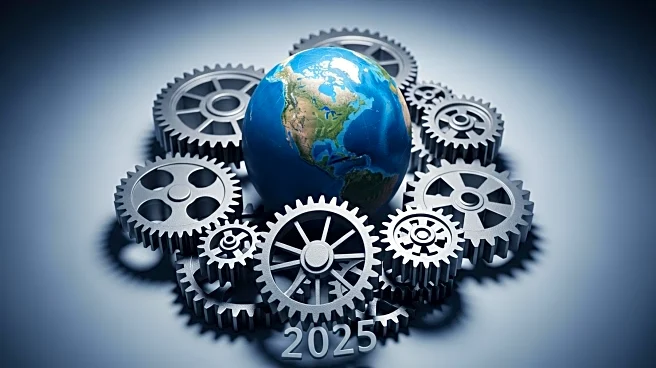What is the story about?
What's Happening?
The World Trade Organization (WTO) has revised its forecast for global trade growth in 2025, increasing it to 2.4% from a previous estimate of 0.9%. This adjustment comes amid a backdrop of robust trade activity in the first half of 2025, driven by factors such as the front-loading of imports into the U.S. in anticipation of higher tariffs, favorable macroeconomic conditions, and increased demand for AI-related goods. However, the WTO warns of a slowdown in 2026, with trade growth expected to drop to 0.5% due to the cooling global economy and the full impact of higher tariffs. The U.S. has played a significant role in global AI-related trade growth, accounting for roughly one-fifth of the expansion in the first half of 2025.
Why It's Important?
The revised trade forecast highlights the complex dynamics of global commerce, particularly the influence of tariffs and technological advancements. The U.S.'s significant contribution to AI-related trade growth underscores its pivotal role in the tech sector, which is a key driver of economic activity. However, the anticipated slowdown in 2026 raises concerns about the sustainability of current trade practices and the potential economic impact of prolonged tariff regimes. This situation presents both challenges and opportunities for U.S. industries, policymakers, and international trade partners as they navigate the evolving landscape.
What's Next?
As the global economy braces for a potential slowdown, stakeholders will likely focus on mitigating the adverse effects of tariffs and exploring new trade agreements. The U.S. may need to reassess its trade policies to maintain its competitive edge in AI and other emerging sectors. Additionally, international cooperation and strategic partnerships could play a crucial role in sustaining trade growth and addressing the challenges posed by protectionist measures.
Beyond the Headlines
The ongoing trade dynamics could lead to long-term shifts in global supply chains, with countries seeking to diversify their trade partners and reduce dependency on tariff-affected markets. The emphasis on AI-related goods also highlights the growing importance of technological innovation in shaping future trade patterns. Ethical considerations, such as data privacy and the digital divide, may become increasingly relevant as AI continues to drive economic growth.















